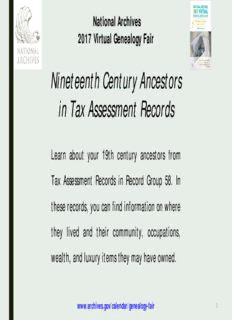
Nineteenth Century Ancestors in Tax Assessment Records PDF
Preview Nineteenth Century Ancestors in Tax Assessment Records
National Archives 2017 Virtual Genealogy Fair Nineteenth Century Ancestors in Tax Assessment Records Learn about your 19th century ancestors from Tax Assessment Records in Record Group 58. In these records, you can find information on where they lived and their community, occupations, wealth, and luxury items they may have owned. www.archives.gov/calendar/genealogy-fair 1 Presenter’s Biography Elise is an Archives Technician at the National Archives at Chicago where she processes and describes records, assists researchers with textual, microfilm, and digital records, and accessions new records into our holdings. She joined the National Archives in 2013 and has previously worked in the research rooms at the National Archives in Washington, D.C. and in the Electronic Records Division at the National Archives in College Park. She holds a B.A. in American Elise Fariello Studies and English Literature from Skidmore College and a Archives Technician National Archives at Chicago M.A. in History with a Public History concentration from American University. www.archives.gov/calendar/genealogy-fair 2 What are Tax Assessment Lists? ■ – Income Cr–e Paetresdon bayl P trhopee Brtuy reau of Internal Revenue to track taxable: – Goods Subject to Special Tax – Licenses ■ These taxes, collected between 1862 and 1874, were used to ■ raise funds for the Civil War Held in NARA Record Group 58 3 What can you learn about your ancestors from Tax Assessment Lists? ▪ Determine their occupation ▪ Find out how they lived 4 What can you learn about your ancestors from Tax Assessment Lists? ▪ Fill in the blanks between Census ▪ years Discover who your ancestor ▪ worked with What level of success they 1863 enjoyed 1866 5 How does the Civil War Tax fit into the history of U.S. income taxes? 6 T■ axation in the Early Republic “No Taxation Without Representation” ■ Article 1, Section 8 of the U.S. Constitution states: “Congress shall have Power To lay and collect Taxes, Duties, Imposts and Excises, to pay the Debts and provide for the common Defence and general Welfare of the United States; but all Duties, Imposts and Excises shall be uniform throughout the United States.” 7 Taxes in the Antebellum Period Whiskey Rebellion threatens the young United States President Thomas Jefferson repeals all direct taxes The need for income tax arose once again with the outbreak of the Civil War 8 Office of the Commissioner of Internal ■ Revenue Created by Congress by the Revenue Act of 1862 ■ Most revenues for war raised by Excise Tax, particularly tobacco – $274 million in income taxes raised and alcohol. In the period between 1862 and 1874 approximately: – $67 million in corporate incomes and dividends – $617 million raised in alcohol and tobacco taxes – $641 million raised from other excise and occupational taxes 9 P■o st-1874 Tax Assessment Lists All Civil War income taxes expired in 1872 ■ Government continued to collect tax on certain businesses and goods sold 10
Description: